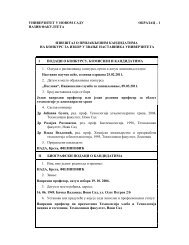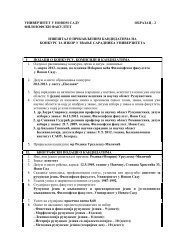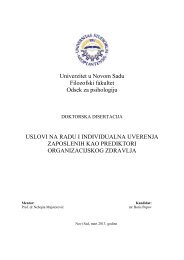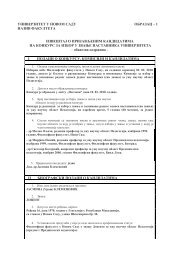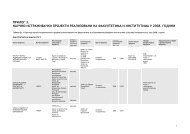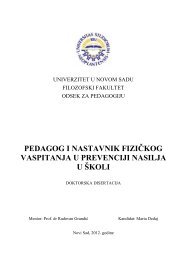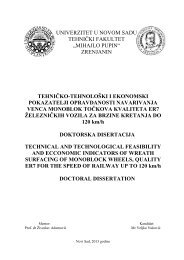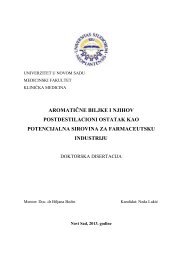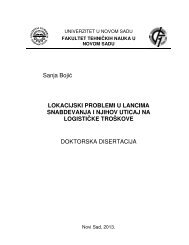- Page 1: UNIVERSITY OF NOVI SAD FACULTY OF P
- Page 4 and 5: Fizički opis rada: FO 6 poglavlja
- Page 6 and 7: UNIVERSITY OF NOVI SAD FACULTY OF P
- Page 10 and 11: 2.5.1. Introduction 105 2.5.2. Tech
- Page 12 and 13: LIST OF TABLES Table PAGE Table 3.1
- Page 14 and 15: LIST OF FIGURES Figure PAGE Figure
- Page 17 and 18: ABSTRACT With the increased interco
- Page 19 and 20: APSTRAKT Ciljevi nastave engleskog
- Page 21 and 22: CHAPTER I - INTRODUCTION 1.1. Backg
- Page 23 and 24: enough attention is given to interc
- Page 25 and 26: shows that in spite of an allegedly
- Page 27 and 28: 1.6. Definitions of terms A more de
- Page 29 and 30: group differentiates between in- an
- Page 31 and 32: For the purpose of the present stud
- Page 33 and 34: CHAPTER II - LITERATURE REVIEW 2.1.
- Page 35 and 36: the experience. Finally, the concep
- Page 37 and 38: problem, but culture is still seen
- Page 39 and 40: Keesing (1974) proposes a definitio
- Page 41 and 42: to the complexity of the concept (B
- Page 43 and 44: 2.1.2. Cultural awareness Cultural
- Page 45 and 46: Ronnau (1994) states that CC requir
- Page 47 and 48: Culture Language world knowledge sp
- Page 49 and 50: The iceberg theory Since culture is
- Page 51 and 52: Hofstede’s onion layers model Hof
- Page 53 and 54: Spencer-Oatey’s model In order to
- Page 55 and 56: 2.2.2. Communicative competence mod
- Page 57 and 58: This observation will be important
- Page 59 and 60:
the ‘development of social respon
- Page 61 and 62:
Celce-Murcia In 1995, Celce-Murcia
- Page 63 and 64:
as dependent on ‘the cultural fea
- Page 65 and 66:
also ‘the cognitive, affective, a
- Page 67 and 68:
The two prevailing comments on Hall
- Page 69 and 70:
The success in intercultural compet
- Page 71 and 72:
already mentioned categorisation of
- Page 73 and 74:
how they guide one’s behaviour. F
- Page 75 and 76:
the experiential, cognitive and soc
- Page 77 and 78:
put forth not only definitions but
- Page 79 and 80:
training which students received be
- Page 81 and 82:
no link between positive attitudes
- Page 83 and 84:
subjective process. Some authors ra
- Page 85 and 86:
easily’ (Oksaar 1990: 242), as th
- Page 87 and 88:
process of cross-cultural mediation
- Page 89 and 90:
stage, but it is a teacher’s role
- Page 91 and 92:
Ruben’s behavioural approach Rube
- Page 93 and 94:
The first one is Denial of differen
- Page 95 and 96:
This stage is a goal of IC training
- Page 97 and 98:
Beamer proposes a model that has fi
- Page 99 and 100:
Hofstede’s culture dimensions Hof
- Page 101 and 102:
The model has been among the first
- Page 103 and 104:
Internal vs. external distinction s
- Page 105 and 106:
these ‘can be achieved through st
- Page 107 and 108:
implementation in the classroom. Ho
- Page 109 and 110:
language mastery, and incorporates
- Page 111 and 112:
connected to the skills of discover
- Page 113 and 114:
Another important characteristic of
- Page 115 and 116:
Intercultural Competence Assessment
- Page 117 and 118:
Kramer The model that Kramer (2000)
- Page 119 and 120:
component is the situation in which
- Page 121 and 122:
hand, an inductive approach since a
- Page 123 and 124:
‣ gain awareness of the things th
- Page 125 and 126:
into practice certain forms they sh
- Page 127 and 128:
a culture (values and beliefs every
- Page 129 and 130:
eporting that people gave a more fa
- Page 131 and 132:
for their preparation for a society
- Page 133 and 134:
web-based self-study. The course wa
- Page 135 and 136:
esearch in the area of ICC in our r
- Page 137 and 138:
However, despite positive results t
- Page 139 and 140:
Understandably, there was a clear d
- Page 141 and 142:
aimed at teachers 27 , or teachers
- Page 143 and 144:
CHAPTER III - METHODOLOGY 3.1. Intr
- Page 145 and 146:
certain of their findings; it enhan
- Page 147 and 148:
students in the research are the fi
- Page 149 and 150:
which represents a degree of comple
- Page 151 and 152:
different groups of students who ha
- Page 153 and 154:
phase, a qualitative technique, an
- Page 155 and 156:
of the interview, here too, the epi
- Page 157 and 158:
these reasons the culture assimilat
- Page 159 and 160:
irritated by the kids’ behaviour
- Page 161 and 162:
The curriculum of the Faculty of Ec
- Page 163 and 164:
with information gathered in interv
- Page 165 and 166:
classrooms varied greatly. Not only
- Page 167 and 168:
insight into the research, but only
- Page 169 and 170:
esearch notes, where the first inte
- Page 171 and 172:
3.9. Summary In this chapter the re
- Page 173 and 174:
CHAPTER IV - RESULTS 4.1. Introduct
- Page 175 and 176:
For the Intrapersonal domain that i
- Page 177 and 178:
Serbian Mean 2,9182 3,4176 3,9778 4
- Page 179 and 180:
English language students In order
- Page 181 and 182:
Total 330 Affect 1 233 169,46 39563
- Page 183 and 184:
Even thought language instruction c
- Page 185 and 186:
there was a statistically significa
- Page 187 and 188:
willingness to engage with others w
- Page 189 and 190:
showed confidence about their inter
- Page 191 and 192:
In order to be analysed, the interv
- Page 193 and 194:
Then, the interviewees were asked t
- Page 195 and 196:
4.4.2. Attributions The central par
- Page 197 and 198:
judgments and finally, to probe for
- Page 199 and 200:
Some kind of prejudice that Serbs a
- Page 201 and 202:
4.4.2.3. Socializing As an importan
- Page 203 and 204:
Maybe he wasn’t ready, maybe his
- Page 205 and 206:
In another critical incident from s
- Page 207 and 208:
We talked about that in Sociology o
- Page 209 and 210:
4.4.2.6. Family life There were two
- Page 211 and 212:
The ability to create an intercultu
- Page 213 and 214:
Lastly, not all interviewees provid
- Page 215 and 216:
CHAPTER V - DISCUSSION 5.1. Introdu
- Page 217 and 218:
subdomains. However, the idea of th
- Page 219 and 220:
academic year in the USA. However,
- Page 221 and 222:
contact with other nations we are b
- Page 223 and 224:
one’s intercultural learning, sen
- Page 225 and 226:
However, the knowledge of customs o
- Page 227 and 228:
a significant role in each of the c
- Page 229 and 230:
It is interesting that none of the
- Page 231 and 232:
FL training should be employed to h
- Page 233 and 234:
al. 2012) and, since authority of i
- Page 235 and 236:
the seniors in the firm. However, t
- Page 237 and 238:
5.2.7. Intercultural awareness Fina
- Page 239 and 240:
interviews were basic and very simp
- Page 241 and 242:
e only implied. Although the mean o
- Page 243 and 244:
5.4. Summary In this chapter the re
- Page 245 and 246:
CHAPTER VI - CONCLUSION 6.1. Conclu
- Page 247 and 248:
the students for the most part foun
- Page 249 and 250:
Another limitation is that the rese
- Page 251 and 252:
The research tool used for the pres
- Page 253 and 254:
REFERENCES Aguilar, M. J. C. (2008)
- Page 255 and 256:
Bennett, M.J. (2004). Becoming inte
- Page 257 and 258:
Byram, M., M. Fleming (Eds.) (1998)
- Page 259 and 260:
Dahl, S. (2004). Intercultural Rese
- Page 261 and 262:
Fennes, H., K. Hapgood (1997). Inte
- Page 263 and 264:
Nishida (Eds.), Communication in pe
- Page 265 and 266:
Ignjačević, A. (1998). Stavovi o
- Page 267 and 268:
Kovalainen, N. (2005). Students’
- Page 269 and 270:
Lincoln, Y.S., E. Guba (1985). Natu
- Page 271 and 272:
Current Trends in European Second L
- Page 273 and 274:
Rickheit, Gert, H. Strohner, C. Vor
- Page 275 and 276:
Sheḳedi, A. (2005). Multiple Case
- Page 277 and 278:
The Common European Framework of Re
- Page 279 and 280:
Yarbro, C.L.M. (1988). An assessmen
- Page 281 and 282:
APPENDICES Appendix 1 - Informed co
- Page 283 and 284:
Appendix 3 - Permission to use the
- Page 285 and 286:
Appendix 4 - The Global Perspective
- Page 287 and 288:
Appendix 5- GPI subdomain items Kno
- Page 289 and 290:
Appendix 6 - Transcription conventi
- Page 291 and 292:
43 R Da li misliš da smo mi toliko
- Page 293 and 294:
uopšte, ima samo par profesora koj
- Page 295 and 296:
Appendix 8 - Critical incidents use
- Page 297 and 298:
(18) Ešli je u Srbiji već jedan m
- Page 299 and 300:
d) Showing one’s love interest mi
- Page 301 and 302:
6. Jack came to Serbia to be a mana
- Page 303 and 304:
9. Veljko is an exchange student of
- Page 305 and 306:
) Dusan took the colleague too seri
- Page 307 and 308:
a) There aren’t many strict rules
- Page 309 and 310:
Ashley: Can’t we at least split i
- Page 311 and 312:
d) He thinks that he is intentional
- Page 313 and 314:
Appendix 11 - Tables and figures Ta
- Page 315 and 316:
Table A.3 Stays abroad and subdomai
- Page 317:
Figure A.3 Department comparison on



